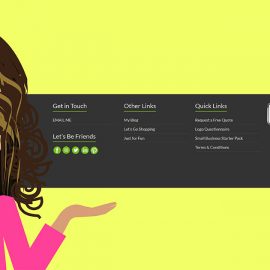
A Freelancer’s Guide to Starting a Website
So you’ve got a business. Now it’s time to give it a home. Your business website is the heart and nerve centre of all of its activities. Obviously, it’s the place that hosts foundational information about your business – what you do and what you sell – and the centrepiece for all of your marketing efforts. But it’s also the heart of your business in that it should speak about who you are and why you are.
Why have a website?
For freelancers, a website is both an extended portfolio/resume and a lead conversion tool. The end goal of your business website is money in your pocket. Your website attracts new clients (through Google search, social media, etc.) and convinces existing leads (referrals, people you met at a networking event) to contact you. The end goal is that email in your inbox that says, “Hey, I’d like to learn more about you.”
For some freelancers, a website can also evolve into a place where they sell physical products, have a blog and host teaching materials or other side revenue streams.
What should your website do?
A freelancer’s website performs 5 main functions. They should be the skeleton of every website, no matter your field.
1. It should clearly convey exactly what you do
On the most successful websites, you understand exactly what the business does within a few seconds. For most freelancers, this means:
- You should include your name and a possibly 1-3 word description of yourself in the header of your website.
- You then use the homepage to further illustrate (either visually or in words) what specific services you provide.
- You should also use the header of each page in your navigation to separate out different services.
2. It should provide your contact information
This is a no-brainer. This is where you’re funneling all your prospects, so they need a way to contact you to get more information. This is not the time to be shy about sharing your contact information. This is why you should create a separate email address for your business, if you’re nervous.
It’s recommended that you:
- Put your email address in the footer of each page.
- Put your email address on the homepage.
- Put your email address on an about or contact page.
- Alternatively, if you really want to hide your email address, use a contact form. This is available in almost all website template services or could be designed easily by your developer.
Most solopreneurs do not provide their mobile number on their website.
3. It should display your portfolio, resume or client testimonials
Your website should communicate your expertise and build a foundation of trust before the client is even a client. In many ways, your portfolio is the heart of your website. This is why many freelancers, especially visual artists, choose to make their portfolio the homepage of their website, so that visitors are immediately asked to browse through items.
It’s no longer a good idea putting a full PDF resume on a website. Instead, you can present yourself in a more compelling way with client lists, your portfolio, your LinkedIn page, testimonials, etc. Your website, as a whole, is a more complete version of your resume.
If a portfolio is not customary in your field, your work is non-material (like consulting), or your work is confidential, do what you can with your client list and testimonials. This involves actively asking for testimonials from past clients – and if you’re a new freelancer, even past bosses. This is not ideal, but it is at least an honest account of your work habits and attitude.
4. It should portray your personality and work ethic
You want to attract the right kind of clients. High-quality clients are attracted by high-quality freelancers by conveying trust, relatability and professionalism in the design and execution their websites.
5. It should be the hub of your all your online activity
Your website should contain links to your social networks, your blog, etc. Freelancers usually choose to put this in the footer or top right header of their websites. Remember that clients will click through to these both to see the number of your followers and to gauge your personality.
In a larger sense, your website should also be the thing that all your online networks lead back to. Your Twitter account should include your website URL in the bio. Your Facebook account should share blog posts from your website, etc.
Design of your website
This is a highly subjective area, but remember: keep it simple! Ideally, you would be able to hire a freelance graphic designer to assist you in developing certain assets for your website, like a header or banner. But if you’re low on funds, find a simple template and keep it bare-bones.
In fact, it’s the fashion of websites currently to be extremely simple. No fancy sliding thingy on the homepage, no flash animation, no dark background textures, no script fonts. Nowadays, clean websites look expensive. Better yet, simple elegance never goes out of style, so chances are that you won’t have to update the look and feel for a while.
Copy for your website
Good copy is simple, relatable and conveys your personality or brand message. It’s worth its weight in gold. It’s best to hire a freelance copywriter who specialises in marketing copy for digital products. Someone who understands that less is more.
If you’re doing this alone, take a long time to write your copy. Don’t just put up anything.
- Think of yourself from your ideal clients’ point of view. What is the true service you’re providing? You’re doing Project Management, but to your client, you’re reducing stress, ensuring things get out the door on time, making their lives easier, etc. Now distill that into 15 words. Hard? Yes. That’s why copywriting is an art form.
- Surface one or two blog posts or portfolio items on your landing page. On a simple website, a single item of your work can do a lot of heavy lifting to convey your style and personality.
- Make the headings for each of your pages (home, about, etc.) very short and clear.
Should you hire a web designer?
If at all possible within your budget, yes. Why? Because if you give a clear breakdown of your business, your brand and your goals to your designer, a good designer will take it from there. Some designers even offer project management services to work with graphic designers and copywriters, so you don’t have to worry about a thing.
The cost for web design work varies widely and also depends on the complexity of your website. Expect to pay more than $5,000 for a website. If you want to sell products on your website, it may cost more than $10,000.
SOURCE: Freelancers Union
Need a professional looking website?



